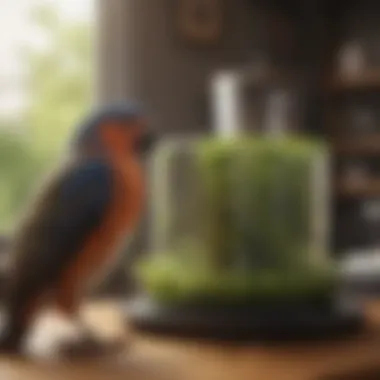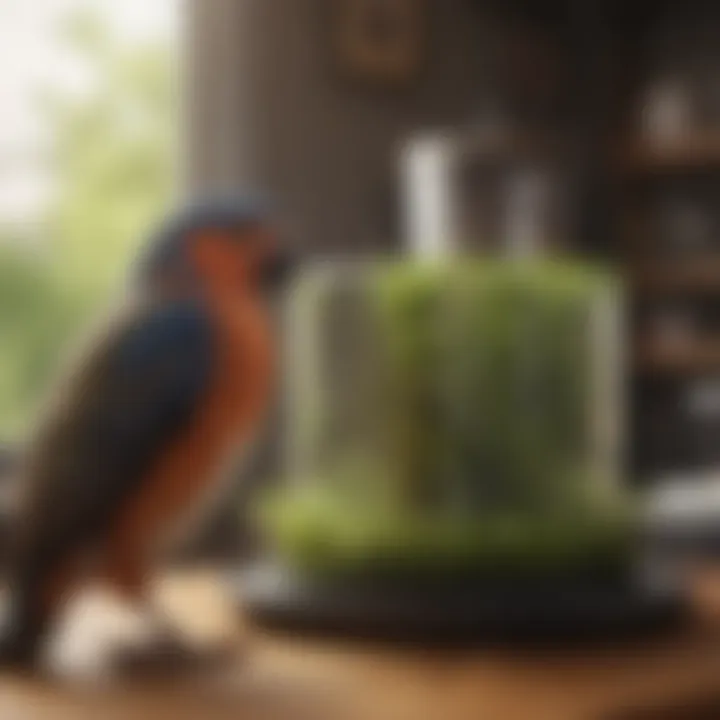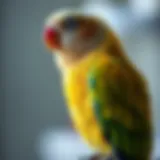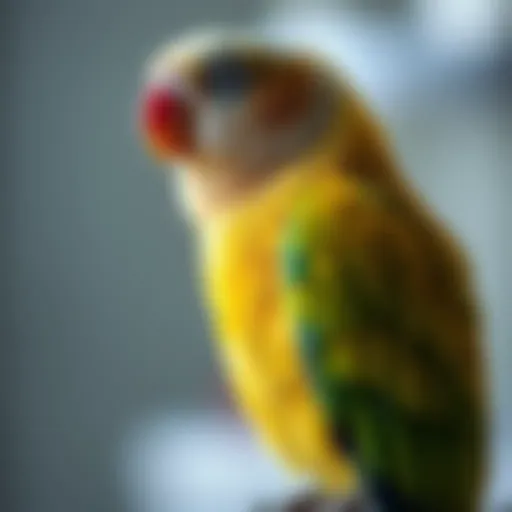Enhancing Avian Health with Quality Air Filters


Intro
When it comes to the care of our feathered friends, pet owners often focus on diet and cage space, neglecting a crucial element of their well-being: air quality. Birds are exceptionally sensitive to their environment, especially air pollutants that may be overlooked. Understanding just how vital air filters are for avian care can be pivotal in enhancing your pet’s health.
This article aims to shed light on the significance of air filters in creating an optimal habitat for birds. We’ll discuss the different types of air filters available, their functionality, and their direct impact on avian health. Bird owners will also learn tips for selecting the right filter based on their specific pet’s needs and how to maintain these devices effectively. By the end, readers will have a well-rounded understanding of how to incorporate air filtering into their pet care routines, ensuring a healthier living environment.
Understanding Your Pet
Pet Behavior Basics
Birds communicate, express emotions, and exhibit social behaviors that are often complex. Just like humans, they react to their surroundings. Birds like Parakeets or Cockatiels may be more vocal and social, while other species prefer quieter habitats. Comprehending these behaviors is essential for ensuring your bird feels secure and healthy in its home.
Common Breed Characteristics
Each bird species has unique traits that dictate their care needs. For instance, while larger parrots such as Macaws require an extensive space for flight and play, smaller finches might be content with less. Always consider your bird's natural habits and behaviors when choosing your living environment and air filtration setup.
Species-Specific Needs
Different types of birds have various specific needs that can be directly influenced by air quality. Birds like Canaries thrive in cleaner, well-ventilated areas, while birds prone to respiratory problems, like Budgies, benefit greatly from high-grade air filters that eliminate dust and dander in their environments.
Importance of Air Quality
Air quality is not just a convenience; it directly affects your bird’s overall health. Poor air quality can lead to respiratory diseases and discomfort. Thus, investing in a suitable air filtration system can pay dividends in the long run.
"A bird that can’t breathe comfortably is a bird that can’t thrive."
Types of Air Filters for Birds
- HEPA Filters: These filters effectively trap tiny particles, including dust and allergens, making them ideal for households with birds.
- Activated Carbon Filters: Excellent at eliminating odors, these filters can be beneficial when keeping birds that may produce a strong smell.
- Ionizers: While they can help reduce airborne particles, you should use them with caution around birds since the long-term effects are not fully known.
Selecting the Right Air Filter
Choosing the appropriate air filter depends primarily on the species of bird in your care. Take into account factors like:
- Size of the Habitat: Larger habitats may require multiple filters or a stronger system.
- Common Allergens: Understanding what allergens exist in your home will help select a filter adept at dealing with particular pollutants.
- Noise Level: Birds often prefer quieter environments, so consider filters that operate silently.
Maintenance of Air Filters
Maintaining air filters is critical to their effectiveness. Here are a few tips on how to keep them in tip-top shape:
- Regular Cleaning: Clean filters often; a dirty filter can become a source of pollutants rather than a solution.
- Replacement Schedule: Change filters according to manufacturer recommendations, or more often if you have multiple pets.
- Monitor Performance: If you notice increasing dust or odors, it might be time to evaluate or replace your filter system.
Culmination
In summary, integrating air filters into your bird care routine isn't just about keeping the air fresh. It's about creating a sanctuary where your feathered companions can flourish. Paying attention to air quality is an investment in their happiness and longevity, providing them with a space to express their natural behaviors without the threat of unclean air adding stress to their lives. Remember, a healthy bird is a happy bird.
Understanding the Avian Respiratory System
Understanding the avian respiratory system is critical for anyone who holds birds as cherished companions. Birds, unlike mammals, have a unique respiratory structure that plays a vital role in their overall health and well-being. The ability for birds to efficiently metabolize oxygen directly correlates with their physical vitality and resilience to diseases. Thus, any measures to improve their living conditions, including air quality, serve as a foundation for their respiratory function.
The hygiene of the environment that birds inhabit significantly influences their respiratory system. Poor air quality can lead to inflammation or infection, affecting their lungs and air sacs. By comprehending how these systems work, bird owners can take intentional steps to create spaces that support their feathered friends. Therefore, delving into the anatomy of bird lungs and understanding the oxygen exchange mechanism is essential for avian enthusiasts who aspire to provide optimal care.
Anatomy of Bird Lungs
Bird lungs differ remarkably from those of mammals. To grasp the essence of this, one must consider that birds possess rigid lungs that don’t expand and contract like ours. Instead, they operate through a system of air sacs that facilitate a continuous flow of air, ensuring that oxygen levels remain stable even when they exhale. This is known as a unidirectional airflow.
- Larger birds like the Andean condor have a complex lung system, which includes numerous air sacs aiding in their high-altitude flights.
- Smaller birds, such as budgerigars, also showcase this design, allowing them to expend less energy during flight and ensuring an abundant supply of oxygen.
The air enters through the trachea and divides into bronchi, eventually reaching the lungs and air sacs. This anatomy serves a dual purpose: it helps maintain buoyancy during flight and enhances the respiratory efficiency necessary for their active lifestyle. Any pollutants present in the air can penetrate this sensitive system, making air filters crucial in creating a healthy environment.
Oxygen Exchange Mechanism
The process through which birds exchange oxygen is streamlined and efficient. Unlike mammals, where air is retained in the lungs during each breath, birds inhale air into their air sacs first. This air then moves through the lungs where oxygen is extracted. Interestingly, this occurs through a network of tiny air capillaries lined within the lungs, allowing for a high surface area for gas exchange.
When oxygen-rich air reaches these capillaries, it enters the bloodstream, while carbon dioxide is removed simultaneously. This unique method allows birds to have a high oxygen supply, which is essential during intense activities like flying.
One key point to note is how this exchange is affected by air quality. High levels of particulates or harmful gases hinder this process and can compromise their health. The implementation of effective air filters can drastically improve the oxygen exchange, ensuring that birds thrive rather than merely survive.
"Providing clear air in a bird's environment can significantly reduce respiratory issues and promote a healthier, more vibrant life for these avian companions."


In summary, proper understanding of how bird lungs operate in conjunction with their oxygen exchange mechanism lays the groundwork for creating a safe, comfortable habitat. This knowledge not only highlights the critical nature of clean air but also underscores how dedicated bird owners can actively contribute to their pet's health through the use of appropriate air filtration and maintained air quality.
Impact of Air Quality on Birds
Air quality plays a significant role in the well-being of birds, both domestic and wild. Unlike humans who can handle a variety of environmental irritants, birds have a more delicate respiratory system. A poor air quality can lead to serious health issues for our feathered companions. It’s important for bird owners to understand how different factors contribute to the air their birds breathe, which directly influences their overall health.
Common Airborne Pollutants
Birds are particularly sensitive to airborne pollutants. There are several common sources of air pollution in households that can negatively impact bird health:
- Dust and Dander: Accumulated dust can irritate a bird's lungs. Many birds shed dander, and when this mixes with dust, it can form a harmful combination.
- Pet Hair and Fur: If you have other pets, their fur might also end up in the air. For many birds, this can cause allergic reactions or respiratory problems.
- Household Chemicals: Common items like paints, varnishes, and cleaners can release volatile organic compounds (VOCs) into the air. Birds are especially vulnerable to these toxins.
- Cigarette Smoke: Just like humans, birds can suffer from secondhand smoke. It’s extremely detrimental to their lungs and overall health.
Being aware of these pollutants is the first step in ensuring clean air for your avian friends.
Symptoms of Respiratory Distress in Birds
Recognizing the signs of respiratory distress in birds is crucial. Birds can’t vocalize their discomfort, so owners must be vigilant. Here are some symptoms to watch for:
- Labored Breathing: Watch for birds breathing with their mouths open. This can indicate a struggle to get enough air.
- Coughing and Sneezing: Frequent coughing or sneezing can be a clear sign of irritation in their respiratory system.
- Change in Vocalization: If your bird is more quiet than usual or has altered sounds, it may be a sign they are not feeling well.
- Fluffed Feathers: Birds will fluff their feathers when they’re unwell, as they are often trying to conserve body heat or cope with discomfort.
If you notice any of these signs, it’s imperative to consult with an avian veterinarian as soon as possible.
Long-term Effects of Poor Air Quality
The long-term effects of prolonged exposure to poor air quality can be drastic and often irreversible. Issues that may develop include:
- Chronic Respiratory Issues: Continuous exposure to irritants can lead to chronic conditions like bronchitis or lung infections.
- Reduced Lifespan: Birds exposed to toxic conditions can have a shortened lifespan, leading to heartbreak for their owners.
- Behavioral Changes: Poor air quality can lead to lethargy, anxiety, and even aggression in some birds. This change in behavior can complicate the bond between pet and owner.
- Decreased Immunity: Birds may become more susceptible to infections and diseases if their airways are compromised over time.
A clean living environment benefits not just your birds but also enhances the overall atmosphere of your home. Therefore, addressing air quality issues is not merely an option but a necessity for bird owners.
Clean air isn’t just about safety; it’s a cornerstone of avian well-being. Your birds deserve a space that promotes health rather than hinders it.
Types of Air Filters for Avian Environments
In the realm of avian care, the types of air filters used in your bird's environment can profoundly influence their health and overall well-being. Quality air filtration serves as the frontline defense against contaminants that can compromise the delicate respiratory systems of birds. From allergens to toxins, ensuring that the air they breathe is clean is paramount. Air filters not only remove particles from the air but also contribute to a healthier living space, fostering an atmosphere where your feathered friends can thrive.
HEPA Filters: A Closer Look
High-Efficiency Particulate Air (HEPA) filters are widely regarded as the gold standard in air filtration. Their efficiency in trapping small particles makes them particularly beneficial for bird habitats. These filters can capture particles as small as 0.3 microns with a success rate of 99.97%. This includes dust, pollen, and even pet dander. For bird owners, the importance of having HEPA filters cannot be overstated. They significantly reduce the airborne irritants that can lead to respiratory issues in birds.
It’s worth noting that while HEPA filters are effective, they require regular replacement to maintain their efficiency. Filters can become clogged over time, so owners should keep a close eye on their condition, opting to replace them as recommended by the manufacturer. Furthermore, these filters often come in various designs to fit most common air purifiers available in the market today.
Activated Carbon Filters
Activated carbon filters work differently from HEPA filters; they focus on adsorption rather than filtration. The porous nature of activated carbon allows it to absorb gases and odors. For bird owners, this is particularly useful for neutralizing unpleasant smells or chemicals present in the surrounding environment. Bird waste, for instance, can generate odors that might be overwhelming if not addressed properly. An activated carbon filter can help mitigate these odors, promoting a more pleasant atmosphere.
Moreover, these filters can remove volatile organic compounds (VOCs) that may be harmful to birds. While they are not designed to catch particles like dust, they serve an essential purpose by focusing on gaseous contaminants. Just like HEPA filters, activated carbon filters also need replacing but generally have a longer lifespan—about six months to a year, depending on usage.
Ionic Air Purifiers
Ionic air purifiers use charged ions to remove impurities from the air. The basic mechanism involves producing negatively-charged ions that attach themselves to positively-charged particles in the air, causing them to clump together and settle out of the air. This means that dust, pollen, and even some bacteria are less likely to remain airborne, making the environment cleaner for birds.
However, while ionic air purifiers may be effective at reducing airborne pollutants, they can have a downside. Some models may produce ozone as a byproduct, which is harmful to avian lungs. Birds are uniquely sensitive to ozone, and even low levels can lead to severe health issues. So if you're considering an ionic air purifier, it’s crucial to check whether it produces ozone, as not all models are created equal. Finding one that both cleans the air and is safe for birds is essential.
Choosing the Right Air Filter for Your Bird
Selecting an appropriate air filter for your avian companion is not just a matter of convenience; it plays a significant role in ensuring optimal health and well-being for your feathered friend. Good air quality contributes to a more lively atmosphere, enabling your bird to thrive in its environment. However, with numerous choices flooding the market, understanding the nuances involved in selection becomes paramount.
Considerations Based on Bird Species
Different species of birds have varying sensitivities and needs when it comes to their respiratory health. For instance, parrots, known for their vocal tendencies, may react differently to air pollutants compared to budgerigars, which might be more resilient. Therefore, before you make a choice, consider these aspects:
- Size matters: Larger birds like macaws require more effective filtration than smaller ones due to higher oxygen consumption.
- Bodily functions: Birds with pre-existing health conditions may need specialized filtering systems to cater to their specific needs.
Knowing the specific needs of your bird's species is vital. Some birds are particularly prone to respiratory issues, so investing in a filter that meets those needs can prevent issues before they arise.
Room Size and Filter Capacity
The effectiveness of an air filter heavily depends on its capacity to clean the air in relation to the size of the room where your bird resides. Inadequate filtering can lead to unresolved air quality problems. Here are a few essential points to ponder:
- Choose the right capacity: Look for filters designed to handle the square footage of your space. A filter that's too small won't clean the air effectively, whereas an overpowered filter in a tiny room could be unnecessarily loud and energy-inefficient.
- Air Changes Per Hour (ACH): This metric indicates how many times the air in a room is filtered each hour. For optimal results, aim for a filter with an ACH rating that fits your room size and avian needs. A good measure is a rating of 4-6 ACH for spaces housing birds.


Calculating your room's size and referring to the product specifications can help ensure that the filter capacity matches your requirements.
Noise Levels and Bird Sensitivity
Birds are exceptionally sensitive to sound, and the wrong air filter can become a source of stress rather than comfort. When selecting an air filter, take into account the sound levels it emits during operation. Factors to consider include:
- Decibel rating: Filters can vary from whisper-quiet to loud and raucous. Aim for one that operates silently, particularly for birds who are skittish by nature.
- Operational modes: Some modern filters include different modes, like quiet or sleep mode, which can significantly decrease sound output while still maintaining efficacy.
Choosing a filter versatile enough to operate quietly can greatly reduce anxiety in your bird, fostering a peaceful living arrangement.
"An air filter is not just about cleaning dust; it’s about creating an environment where your birds feel healthy and stress-free."
Understanding these factors not only helps in keeping your bird in good health but also in providing a serene living environment that contributes to their overall happiness.
Installation and Placement of Air Filters
When it comes to maintaining a healthy environment for birds, the installation and placement of air filters cannot be underestimated. Proper placement not only ensures optimal air quality but also enhances the overall well-being of your feathered companions. Getting this right leads to cleaner air, which can significantly influence the respiratory health of birds, helping them avoid unnecessary distress caused by pollutants.
Ideal Locations for Filter Units
Choosing the best spots to install air filters requires a bit of forethought. Firstly, consider the airflow in the room. Placing a filter where it can actively circulate air allows it to perform effectively. Here are a few tips for ideal locations:
- Near Bird Cages: Position the filter close to the bird’s living space, ideally within a few feet. This maximizes the amount of purified air that reaches your avian friends.
- Away from Walls: Filters work best when they have space around them. Avoid placing them snug against walls or in corners. This ensures unobstructed air flow.
- Avoid Direct Sunlight: Filters functioning under direct sunlight can overheat and may not work properly. It’s better to find a shaded location that still allows for good air movement.
- Consider Other Factors: Think about where people spend the most time. Filters should be placed where family members, including children and other pets, won't disturb them.
Placing filters in strategic spots can pay dividends, as they will work harder and yield better results.
Avoiding Common Mistakes
Even the most well-intentioned bird owners can fall into some pitfalls when it comes to filter installation and placement. Here are a couple of blunders to steer clear of:
- Ignoring Filter Size: Using a filter that's too small for the room can lead to inefficiencies. Make sure it's rated for the size of your bird room to guarantee proper air circulation.
- Neglecting Maintenance: Some might forget how vital it is to regularly check and replace filters. Clogged filters can actually worsen air quality instead of improving it.
- Overlooking Electrical Safety: It’s essential to keep filter cords secured and out of reach of curious beaks. This prevents accidental chewing, which can lead to complications.
- Misjudging Ideal Locations: As mentioned, not using the right position can compromise the filter's effectiveness. A common mistake is to tuck it into too small a space; air needs room to move.
Remember, taking time to properly install and place your air filter sets the groundwork for a healthier habitat, ensuring your birds can breathe easy and thrive.
"Clean air is not just a luxury; it’s a necessity for our avian friends. Install filters wisely!"
In summary, careful consideration in the installation and placement of air filters lays a solid foundation for enhancing avian health. Following best practices in position and avoiding common mistakes will lead to a more stable and enriched environment for your birds.
Maintenance of Air Filters
Maintaining air filters is not just a chore; it's a vital part of ensuring that your feathered friends live in a healthy environment. Filters work hard to trap all those nasty particles floating in the air, from dust to dander, and they depend on regular upkeep to keep performing at their best. Ignoring this can lead to clogged filters, reduced air quality, and that’s the last thing you want for your bird. Let's unpack the necessity of keeping air filters in tip-top shape.
Regular Cleaning and Replacement Guidelines
Clean air filters are the foundation of good air quality. So, how often should you clean or replace them? It largely depends on your specific environment and the type of filter used. Here are some guidelines to follow:
- HEPA Filters: These should be replaced every six months, but if you notice a dip in air flow, you might want to check monthly.
- Activated Carbon Filters: These need changing more frequently due to their role in capturing odors and volatile compounds. Every three months is often a safe bet.
- Ionic Purifiers: While they produce charged ions to cleanse the air, they also require occasional cleaning. Dust off the collection plates at least every few weeks.
Set a reminder on your phone or keep a log near your bird's habitat. A little diligence goes a long way to keeping your avian companions free from respiratory issues.
Monitoring Indoor Air Quality
Keeping an eye on the air quality within your bird's environment is crucial. Even with filters keeping things clean, other factors such as humidity and room temperature can affect air quality.
Here are a few tips to help monitor and maintain optimal air conditions:
- Invest in an Air Quality Monitor: These devices can provide real-time data on levels of particulate matter, humidity, and even temperature.
- Check Humidity Levels: Ideally, the humidity should reside between 40-60%. Too low can dry out your bird’s delicate airways, and too high can encourage mold and mildew.
- Ventilation is Key: Ensure there’s proper airflow in the bird's room. Open windows when it's safe and check that exhaust fans function properly to circulate air.
“A healthy bird thrives in a healthy atmosphere.”
In summary, the maintenance of air filters is not a mere accessory for bird care; it serves as a keystone in avian health strategies. Recognizing the signs that suggest filters need attention and keeping track of how often these should be changed helps prevent the risk of inhalation issues. By taking these steps, the air your birds breathe becomes a champion for their vitality.
Complementing Air Filters with Other Practices
Air filters play an essential role in maintaining a safe environment for our feathered friends. However, these devices alone can't do all the heavy lifting when it comes to air quality. It's crucial to think about other practices that can work hand-in-hand with air filters. These practices can enhance the effectiveness of your filtration system and contribute to a healthier living space for your birds.
Ventilation Tips for Bird Rooms
Ventilation is a key element that seems to get overlooked way too often. Proper air circulation helps to dispel stagnant air and reduce the buildup of harmful particles, even with the best air filter.


- Open Windows When Safe: When the weather allows, open windows for a short period to allow fresh air in. Just make sure there are no drafts or openings that can let in predators.
- Use Fans Carefully: Attaching fans to create air movement near the ceiling can help circulate air without blowing directly at the birds. Birds can be sensitive to strong drafts, so placing it wisely is key.
- Install Screen Vents: For fixed setups, consider screen vents that allow airflow while keeping out bugs or larger debris.
- Position Filters Strategically: Place the air filters in locations where they can best catch incoming fresh air and filter out outgoing stale air.
The aim here is not to create a hurricane that tosses your birds around, but to ensure they breathe easy. Small tweaks can lead to a big difference in their quality of life.
Chemical-Free Cleaning Products
Using chemical-laden cleaning supplies can wreak havoc on sensitive avian respiratory systems. If you're cleaning your bird's space, consider swapping out those harsh products for alternative solutions that won't raise a red flag.
- Vinegar and Water: A natural disinfectant and deodorizer. Mix equal parts vinegar and water for a safe cleaning solution. Use it on perches, cages, and toys to keep them spick and span.
- Baking Soda: Tackles odors and stains effectively without harmful fumes. Sprinkle some on surfaces and scrub lightly, then wipe clean with a damp cloth.
- Essential Oils (Use Sparingly): Some pet owners recommend specific essential oils that are safe for birds. Always ensure any products used are free from synthetic fragrances, as these can be more harmful than helpful.
- Hydrogen Peroxide: A great alternative for disinfecting. A diluted 3% solution can clean surfaces effectively without the harshness of bleach.
It's essential to aim for a holistic approach, ensuring that the environment your birds call home is both clean and safe. Reducing the chemical footprint can do wonders not just for your birds but for everyone in the household!
**"Air quality is not just about filtering the dust; quality cleaning practices set the stage for a healthier atmosphere."
Recognizing the Signs of Improved Air Quality
When it comes to ensuring the well-being of our feathered companions, understanding how to recognize the signs of improved air quality is vital. Birds, being particularly sensitive to their environment, can directly reflect changes in their habitat. Monitoring their behavior and health post-installation of air filters isn’t just beneficial; it’s essential for long-term avian health. Not only can it provide peace of mind for pet owners, but these indicators also serve as essential feedback on the effectiveness of the air filtration systems in place.
Behavioral Indicators in Birds
Behavioral changes in birds are often the most immediate signs of improved air quality. Once contaminants are effectively filtered out of the environment, many owners may observe the following:
- Increased Activity: Birds that were once lethargic might suddenly become more playful. You may see them flapping their wings more often or engaging in their favorite play behaviors.
- Vocalization Changes: Birds, like lovebirds and cockatiels, could display more vocal enthusiasm. A previously quiet bird might begin to chirp or sing more, indicating contentment and improved energy.
- Reduced Feather Plucking: Stress from poor air quality can lead birds to develop habits like feather plucking. Once the filters work their magic, a reversal of this behavior could be a positive sign.
"When birds feel secure in their environment, they are more likely to express natural behaviors, which is a critical indicator of their well-being."
The key is to keep a close eye on them and note any significant changes. Typically, improved air quality leads to overall happier and healthier birds.
Health Improvements Post-Installation
Alongside behavioral shifts, tangible health improvements can also indicate that the air quality around your birds is on the upswing. Such improvements may include:
- Clearer Breathing: If your bird had been showing signs of struggles in breathing such as wheezing or labored breaths, these symptoms may lessen. A bird’s respiratory rate should stabilize, making them appear more relaxed.
- Decreased Incidence of Respiratory Issues: Fewer episodes of sneezing, coughing, or other respiratory troubles mean that allergens and pollutants are being adequately filtered out. Owning birds can come with various health challenges, and addressing the air quality can lighten that load significantly.
- Shinier Feathers: Good air quality can also lead to improvements in feather condition. Bright, well-groomed feathers indicate a healthy bird. If they are fluffing themselves more or their feathers seem less dusty and dull, it's often a good sign.
Regular check-ups after cleaning or changing your air filters can help you track these health indicators. Monitoring their physical and behavioral changes goes hand in hand with ensuring a safe and welcoming environment for them.
In essence, recognizing the signs of improved air quality involves a keen observation of your bird's altered habits and overall health status. Understanding these factors gives pet owners a greater appreciation of the direct relationship between air filters and bird health.
The Role of Air Filters in Avian Health Education
Air quality plays an intricate role in the overall well-being of birds. Birds are particularly sensitive to airborne pollutants, making education about air filtration critical for their health. This section delves into the necessity of educating bird owners about air filters, their benefits, and practical considerations regarding their use. Proper air filtration can avert many health complications in birds, thus fostering a healthier domestic environment.
Raising Awareness Among Bird Owners
It's essential for bird owners to fully grasp the significance of clean air. Many people underestimate how invisible pollutants can affect their birds’ health. Without proper education, misconceptions can arise. For instance, some pet owners might think that their homes are automatically safe and clean just because they appear tidy. Yet, indoor spaces can harbor pollutants like dust, mold, and even fumes from cleaning products. Even though these might not affect the human residents severely, birds can react quite differently.
- Educating on Airborne Threats: A number of resources are available that highlight the specific substances that can harm birds. Notably, lead dust from paint or even toxins off gas stoves can be detrimental. Workshops and community talks led by avian veterinarians can play a crucial role. Birds suffering from respiratory issues often display signs like changes in their vocalizations, lethargy, or feather plucking.
- Shared Experiences: Creating spaces where bird owners can share their experiences strengthens community ties. Forums that encourage discussion about air quality can illuminate various factors one may overlook. Leveraging platforms like Reddit can effectively spread knowledge.
In summary, raising awareness about the importance of air filters not only emphasizes the protection of birds but also encourages owners to foster a culture of care and vigilance concerning indoor air quality.
Community Resources and Support
The significance of community support cannot be overstated. When bird owners band together, they create a powerful network for sharing resources and information about air filtration. Availability of local resources can make a difference in enhancing avian health through education.
- Local Clubs and Organizations: Many regions have bird clubs or avian enthusiasts’ associations. These organizations often provide informational sessions, toolkits, and access to external experts. Establishing a connection with these groups can provide ongoing support and advice about air filters and their proper use.
- Workshops and Demonstrations: Hosting events where experts explain air filter functionalities can greatly enhance understanding. For example, live demonstrations showing how to change filters or maintain air purifiers can be eye-opening for many owners.
Case Studies: Birds Thriving with Enhanced Air Quality
Understanding how air filters contribute to avian health is not just theoretical; it’s backed by real-life examples. Observing birds in environments where air filtration practices are effectively utilized offers valuable insights into the tangible benefits these systems provide. These case studies showcase the positive impact enhanced air quality can have on both wild and domestic birds, reinforcing the necessity of clean air for their overall well-being.
Examples from Bird Sanctuaries
Bird sanctuaries represent havens for various avian species, where conservation efforts and health maintenance are paramount. In numerous bird sanctuaries across the globe, incorporating high-quality air filters has been a game-changer. For instance, the Wings of Freedom Sanctuary implemented advanced HEPA filtration systems that significantly reduced harmful airborne particles. The results were visible:
- Improved Respiratory Health: Birds previously showing signs of respiratory distress showed significant improvement in their overall health, with reduced coughing and wheezing.
- Increased Activity Levels: Many birds became noticeably more active, spending increased time engaging with their environment and socializing with other birds.
- Enhanced Breeding Success: Sanctuaries noted better breeding rates, attributed to healthier parental birds, which is a direct correlation with air quality.
Such sanctuaries are not just focused on shelter; they aim to replicate ideal living conditions found across natural habitats. This kind of care exemplifies how air filtration can make a real-world difference.
"Clean air can transform not just a bird's environment, but its very quality of life."
Home Success Stories
The positive influence of air filters isn't limited to sanctuaries. Many bird owners have documented their experiences after upgrading or introducing air filtration systems into their homes. One prominent example comes from The Happy Parrot Family, who shared their journey on social media. After installing an activated carbon filter, they reported:
- Reduction in Allergens: Their previously allergy-prone budgie, Sunny, experienced fewer allergy symptoms, demonstrating the filter's capacity to trap dust and pollen.
- Calm and Healthy Behavior: Sunny's mood shifted. Less irritable and more relaxed, the bird exhibited improved behavior that comforted the family.
- Long-term Health Benefits: The family noted fewer vet visits related to respiratory issues over the next year, giving peace of mind regarding Sunny's health.
These narratives exemplify how even small changes in air quality through effective filtration can lead to remarkable outcomes for pet birds. By prioritizing air filtration, pet owners are investing in the longevity and vitality of their feathered companions.







